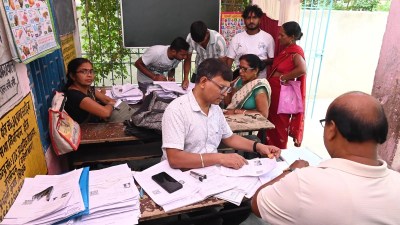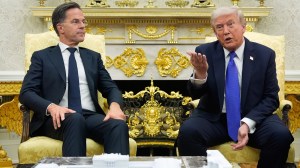The tragic flaw of a nuclear South Asia
Prof Joseph Rotblat, winner of the Nobel Peace Prize for 1995 along with hisanti-nuke organisation Pugwash, revealed in Mumbai last week ...

Prof Joseph Rotblat, winner of the Nobel Peace Prize for 1995 along with hisanti-nuke organisation Pugwash, revealed in Mumbai last week that he hadbeen one of the prime movers of the atom bombs that destroyed Hiroshima andNagasaki. News filtering down the nuclear grapevine at the time had it thatGermany was involved in research for fabricating the atom bomb. Rotblat,fearing the consequences of a nuclear button under Hitler’s finger,approached James Chadwick at Los Alamos and made a strong case fordeveloping the Bomb to counter the German move.
But later, it transpired that Germany had given up on the Bomb. Rotblatimmediately felt that the Manhattan Project the US programme to developthe Bomb ought to be stopped, for it was not in the interests of humanitythat science should create a weapon of mass destruction. Eight months beforethe Bomb was actually dropped on Hiroshima, Rotblat resigned in protest.
Rotblat was asked whether he would advocate making the Bomb in India, if aHitler were perceived to be across the border. "You are asking a difficultquestion," he replied. "Let me say that I am a pacifist, but I am not anabsolute pacifist. Honestly, I do not know what I would have done if such asituation were to recur today."
It is not difficult to see that Rotblat’s dilemma is India’s dilemma: thedangers attendant upon pursuing a proactive nuclear policy posited againstthe interests of social welfare, ethical politics and plain humanity.
As the millennium draws to a close India, for better or for worse, hasovertly committed herself to deploying a nuclear arsenal to keep her land,water and air secure. The nuclear doctrine released earlier this year hasespoused a "minimum credible nuclear deterrence". The doctrine would seem todisavow the ethical, moral and socio-political structure of Gandhian valuesthat India simultaneously espouses and propagates. The contradiction isidentical with that within Rotblat and the irony is immediately manifest:
the 91-year-old Nobel Peace Prize winner was in India to receive theJamnalal Bajaj International Award for promoting Gandhian values outsideIndia. It is a conflict between idealism and the practical dispensation ofthat idealism in terms of the politically felt need for a nuclear arsenal tokeep India secure against the possibility of a threat comparable insubstance to that posed by the Axis to the rest of the world from acrossthe borders.
At a personal level, Rotblat paid a price for the stand he took. Accordingto his own account in his address delivered to Pugwash on the 40thanniversary of the Bertrand Russell-Albert Einstein Manifesto, intelligenceofficers produced a dossier to prove that Rotblat was a Soviet spy. It wasalleged that the purpose of his resignation was "to get to the Soviet Union by enlisting into the Royal Air Force and commandeering an airplane toparachute down on Soviet territory in order to give away the secrets ofthe atom bomb." What is more important, however, is the logic that led toRotblat’s pacifism.
Events proved, says Rotblat, that American persistence with the Bomb was notdue to the German threat but a future Soviet threat, something GeneralLeslie Groves, who headed the Manhattan Project, made abundantly clear.
Almost all the main artificers of the Bomb foresaw, as early as themid-forties, that their work could trigger a nuclear arms race. "In theoffice next to mine," Rotblat told Pugwash in 1995, "Edward Teller and StanUlam were working on the super-project, the hydrogen bomb, with adestructive power at least three orders of magnitude higher than that of theHiroshima bomb… I remember the predictions of Niels Bohr, with whom I hadfrequent conversations in Los Alamos, that any use of the Bomb would be seenby the Soviets as a threat to their security and impel them to develop theirown Bomb. Bohr foresaw, with prophetic vision, the dire consequences of anuclear arms race and the ensuing danger to civilisation."
A parallel scenario seems to be unfolding in South Asia today. The GrovesDoctrine, which used the Bomb to demonstrate America’s might to the SovietUnion at the cost of tens of thousands of human lives, holds crucial lessonsfor South Asia. The US political establishment was in agreement with thethreat perception as projected by the nuclear-military establishment. Atthat point of time, the USSR did not have the Bomb. Therefore, America’sdeployment of the Bomb must be seen as a response to the fear that it maynot have had the capability to win a conventional war against the SovietUnion. Once the US Bomb was a reality, the Soviets had only one courseopen.
The vicious cycle is now part of history: the arms race, the Cold War, thesheepish START negotiations, et al. The meaninglessness of this historicalprocess is patently obvious: first create weapons, then proliferate them,then talk of restricting them, and follow it up by talking of eliminatingthem! Ironically, this entire sequence is being replayed in the written andunwritten nuclear doctrines in South Asia.
One view, offering a causal analysis of this sequence, explains thephenomenon as the only way for the nuclear-military industry to survive. Thedynamics of survival depends upon answering the question whether developingand deploying nuclear weapons is the only way to address the conflictingsecurity perceptions in South Asia. A few months ago, Indian Expressasked R. Chidambaram, Chairman, Atomic Energy Commission and Secretary,Department of Atomic Energy, whether the department made any recommendationswith regard to nuclear threat perceptions. The reply: "We will be failing inour duty if we do not advise the government. It is up to them whether toaccept our recommendations or not." The catch in this vicious logic is thatno political dispensation in New Delhi can ignore the `advice’ of scientificpeers. It’s like a Greek tragedy being played out in the heroic mode withpolitical hubris at one end and scientific hubris at the other, servingjointly as the tragic flaw.
Like Mahatma Gandhi in his time, Sir Joseph Rotblat, the best knownsurviving nuclear pacifist at the age of 91, emerges as a man caught in theskewed logic that ensures the survival of the nuclear-military-political-industrial complex. They are meant to be deified, awarded, talked andwritten about, but never paid heed to. And at stake is peace, not only inSouth Asia, but in the world of the 21st century.



- 01
- 02
- 03
- 04
- 05




























